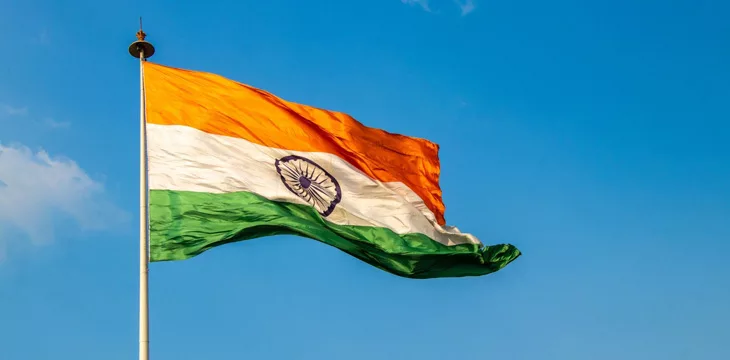|
Getting your Trinity Audio player ready...
|
If you are an avid follower of technology, you must know that blockchain has been a buzzword for a while now, globally and in India. Experts believe by the time India’s independence turns 100 years old, it will become a blockchain hub by utilizing all the use cases of the technology.
At its core, blockchain is a decentralized ledger that allows for secure, transparent, and immutable transactions. This technology can potentially transform a wide range of industries, from finance to healthcare to supply chain management.
The clock is ticking, and we just have 24 years now to make the country a blockchain hub hence this Independence Day, we spoke with several industry experts to understand how to unleash the vision for 2047.
‘Blockchain is the hyperlink to the future’
Deepak Syal, director and co-founder of global innovation consulting firm GreyB, compared the evolution of the Internet with the probable evolution of blockchain technology by 2047.
“We all browse the Internet today by clicking on hyperlinks, jumping from one article to another. If we trace the roots, the invention of Hyperlinks can be traced back to 1989 to one of the patents of British Telecom. Nobody thought at that time that such a basic thing will be fundamental to what the Internet is today and will be revolutionary in 30 years. Hyperlinks became popular because they allowed people to connect their ideas.”
“I remember when the first paper on blockchain was published in 2008. It was ignored by most of the people. I think blockchain is the hyperlink of the future. Today, it is great to see that Indian companies like Mesbro, TCS, and Cialfor Research are actively innovating in Blockchain technology. There is no doubt that blockchain will be fundamental to everything that we are going to do 20-30 years from now,” added Deepak.
‘Blockchain is here to solve existing inefficiencies’
Kumar Gaurav, founder and CEO of a global fintech firm Cashaa, believes that with a lot of inefficiencies existing in various spheres in a developing country like India in fields like governance, public service, healthcare, supply chain management, and real estate, among others, blockchain technology is here to solve a lot of the existing inefficiencies and delays.
“Finally, a well-defined and reasonable regulatory framework can also help with faster adoption and greater innovation in this space in India,” he said.
‘The future is decentralized’
Rajagopal Menon, Vice President of cryptocurrency exchange WazirX, said, “Betting on blockchain, which turned out to be the operating system for transforming banking, finance, accounting, insurance, broking, supply chain, shipping, media, entertainment and a whole host of other industries, India was able to move from a 2000 dollar PCI nation to a $10,000 PCI nation. By 2047, with robust regulatory frameworks and innovative startups, India hasn’t just adopted blockchain; it has redefined its global trajectory. The future is decentralized, and India leads the charge.”
Shrikant Bhalerao, CEO and Co-founder of Seracle, believes that India will emerge as an established leader in the technology space, including blockchain, with the largest number of skilled engineers and entrepreneurs.
The public-private partnership will double the efforts toward Vision 2047
The use of blockchain technology in the digital asset ecosystem is also expanding, with real use cases emerging. At some point, experts expect to see blockchain tech replacing traditional databases everywhere. From immutability to audit trail to reconciliation, blockchain provides a massive advantage to user entities. Already, bodies like TRAI and the National Stock Exchange (NSE) are trying to use blockchain-based systems. These developments and the associated adoption of the technology globally augur well for the ecosystem.
Vikram Subburaj, CEO of Giottus digital asset exchange platform, said, “For India to gain an advantage over the next 20 years, companies and institutions need to be incentivized to innovate in this field with a well-defined regulatory framework along with favorable tax structures. In its G20 presidency, India is already putting its foot forward to standardize global use of the technology. These initiatives are sure to place India at a vantage point and take the country to the forefront of blockchain initiatives.”
Alankar Saxena, CTO and Co-founder of Mudrex, a global crypto-investing platform, believes that prioritizing blockchain technology, investing in essential infrastructure, and cultivating a supportive environment for blockchain enterprises can elevate India’s standing as a significant global player in the dynamic world of blockchain.
Anil Kakani, vice president and head of Country Operation AlgoBharat, believes that if India expands the developer base, supports Web3 startups, and forges partnerships with established organizations, it is bound to become a blockchain innovation leader by 2047.
Sathvik Vishwanath Co-founder and CEO of Unocoin, said,“A concerted effort to integrate blockchain solutions across sectors is necessary. The use of blockchain for governance, supply chain management, healthcare, finance, and more will demonstrate its practical applications and promote widespread adoption.
In conclusion, India’s vision of becoming a blockchain hub by 2047 is achievable through a combination of innovative research, supportive regulations, skill development, global collaboration, and real-world implementation. By adopting this decentralized technology, India can not only usher in an era of economic prosperity but also contribute significantly to the global blockchain revolution.
The regulatory framework needs to be in place by then!
Well, for all this to happen smoothly, experts believe that India should have a regulatory framework in place as soon as possible when it comes to blockchain and cryptocurrencies. Shubham Gupta, Co-Founder and Chief Product Officer at STAN, said, “Given the abundant tech talent in India, nurturing this ecosystem through targeted educational initiatives, fostering blockchain startups, and establishing supportive regulatory frameworks that both protect and promote innovation feels not only like the natural course of action but also an essential cornerstone for India’s leadership in this domain.”
Watch: India is critical to Satoshi Nakamoto’s vision for Bitcoin

 02-17-2026
02-17-2026 




